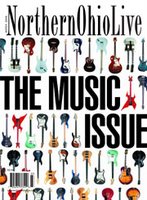 How Sabbath's Rock Poetry
How Sabbath's Rock PoetryStirred the Soul of Miles B
I'd be hard-pressed to think of a subject I care less about than heavy metal rock music. Maybe gardening and the history of urology would ordinarily bore me even more, but it's close. And yet great writing has the unique ability to make one care about any subject at all, either because it evokes memories and explores themes that are more universal to the human experience, or because it uses language in such gorgeously evocative ways that it grabs you and doesn't let you go. Or both.
Working With Words reader and occasional commenter Milenko Budimir, a.k.a. Miles B, (click here and scroll down to read his poem "Rustbelt Romance") has just published one such bit of writing in the current issue of Northern Ohio Live. It's a stunning tribute to the band Black Sabbath (on the occasion of its induction into the Rock Hall) and what its lyrics meant to him as a working-class kid. Because the piece is not online, I'll reprint it in its entirety below (good for you for publishing such wonderful stuff, Sarah Sphar). I hope this piece is one day reprinted in an anthology of the best writing to come from this town. It's really that melt-in-your-mouth good. Just listen to it:
This month, after years of being overlooked, turned away and being rejected seven different times, Black Sabbath will finally be inducted into the Rock & Roll Hall of Fame. I, for one, welcome them. And I think the four blokes from Birmingham, England--known as the "workshop of the world" during the heyday of the Industrial Revolution--would understand Cleveland.
While noted for its showmanship and horror-movie imagery, what really set Sabbath apart from other bands of the early 1970s was its unmistakable sound: the menacing weight and raw power that laid the foundation for heavy metal, with Ozzy Osbourne's otherworldly voice hovering over it all.
Maybe it was having their early lives forged in a town surrounded by the sounds of industry, but whatever it was, the world that music opened up was darker and seemed closer to the reality that I and many of the working people around me knew so well. The band's lead guitarist, Tony Iommi, who lost the tips of two fingers in an industrial accident, was someone I could understand. Hell, some of my father's best friends had missing fingers. I understood what Black Sabbath was signing about in
"Killing Yourself to Live," because I could look at my father working six days a week, and it made sense.
Oddly enough, mixed with the usual adolescent rebellion, it let me see my parents in a different, almost sympathetic light. For the most part, my friends and I were not from the affluent or upper middle class, were not considered well off. We were the sons of machinists and housewives, factor workers, Vietnam vets, bookies, hardscrabble entrepreneurs whose parents and grandparents hailed from lands with Slavic tongues
It all made sense somehow.
Many times, I'd lie alone on my bed in the dark, oversized Sony headphones cupping my ears, a single red LED light glowing from the stereo, and lose myself in the music. It made me understand something essential about the world. Something that no sugary pop song could ever do. That sometimes things don't work out for the best. That maybe, yes, drugs and alcohol seem like the only way to deal with your rotten life. It was like getting advice from a big brother or an older friend who understands, yet doesn't condemn.
The world isn't fair, they were saying, and people often get crushed under the weight of their lives or their work, or by dumb luck. And yet, despite it all, it's worth carrying on, surviving to live another day.
And for that insight learned so long ago, Black Sabbath has my eternal thanks.

1 Comments:
Just be sure to stop me if I start sounding like Feagler...
Post a Comment
<< Home